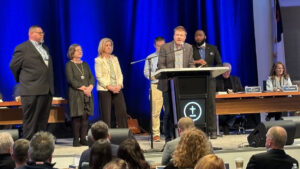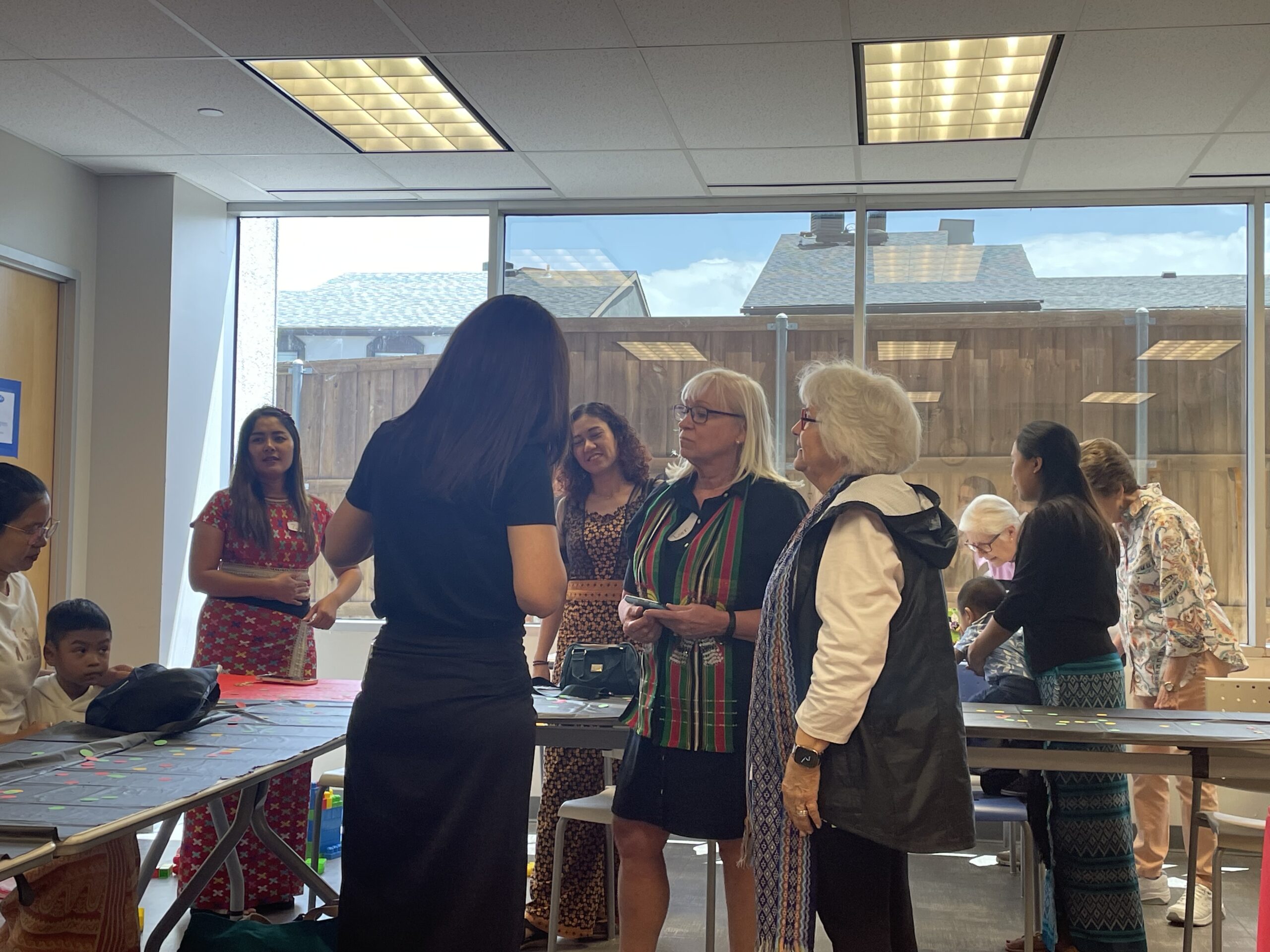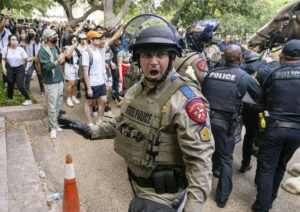Huntsville church engages ex-offenders in prison ministry
Covenant Fellowship in Huntsville seeks to engage ex-offenders in ministry to the incarcerated population—for the mutual benefit of both.
“Men on the inside are more likely to listen to guys who have worn the same white uniforms and walked in the same state-issued shoes they wear,” said Scotty McKinley, pastor of discipleship and missions at Covenant Fellowship.
Since Covenant Fellowship launched in 2008, the church has ministered to individuals inside Texas Department of Criminal Justice facilities—both inmates and correctional officers—through multiple avenues.
Involving ex-offenders in ministry to currently incarcerated men benefits those who have reentered the free world and those who are preparing to do so, Eddie Harmon said.
‘Not just a Sunday thing’

Harmon, lead elder at Covenant Fellowship, became involved in prison ministry 14 years ago when he accompanied Pastor David Valentine inside a correctional unit.
“I had never been inside a prison before,” Harmon said, but added he soon realized, “This is where I’m supposed to be.”
Within the course of a few weeks, he saw how God was changing inmates’ lives in dramatic ways.
“They ‘get’ Jesus more than those in the outside world do. They understand he can do for them what they can’t do for themselves,” Harmon said. “It’s not just a Sunday thing for them.”
Harmon became a certified volunteer chaplain assistant with the TDCJ. He serves at least one day a week—often more—in the John M. Wynne Unit.
‘No playing games with them’
He considers preparing inmates for life in the outside world as a key part of his ministry, along with staying in close touch with men after their release.
“I stay in contact with guys all over the state,” he said.
For those who live within driving distance of the Wynne Unit, Harmon seeks to involve them in ministry to current inmates. He recognizes they have an instant rapport and built-in credibility with the men inside prison.
“I’m just an old, retired white man who lived a pretty good life. I don’t have much to offer them,” Harmon said.
Incarcerated offenders are more likely to listen to the Christian testimony of someone who has been in prison and who successfully transitioned to life in the free world, he said. Some of the ex-offenders served lengthy sentences at the Wynne Unit, and men on the inside knew them—before and after God changed their lives.
“There’s no playing games with them. They can’t hide anything. They’ve seen it all,” Harmon said. “It helps guys on the inside realize there’s life after prison.”
Returning to prison as a volunteer also benefits the ex-offenders, he added.
“It helps them stay strong,” Harmon said. “They realize it’s such a privilege getting out, and now they can do some good, helping people inside.”
Celebrate Recovery—inside and out
Recognizing many offenders and ex-offenders have a history of alcohol and drug abuse, Covenant Fellowship seeks to provide recovery groups—both for men inside prison and for anyone in the community.

McKinley oversees both a Celebrate Recovery 12-step group at his church and a Celebrate Recovery Inside group in the Wynne Unit. He recognizes the value of the program from firsthand experience.
“A decade ago, I realized I had a problem with alcohol I could not fix myself and needed help,” McKinley said. “Celebrate Recovery was life-changing for me.”
Saddleback Church in Southern California launched Celebrate Recovery in 1991 as a Christ-centered program for people dealing with addictive, compulsive and dysfunctional behaviors.
The Celebrate Recovery Inside group at the Wynne Unit grew out of McKinley’s encounter with an inmate. Like Harmon, McKinley was accompanying Valentine on visit to the Wynne Unit.
An inmate spotted the Celebrate Recovery logo on McKinley’s shirt and asked if a group was starting at the unit. McKinley asked him to pray about it and agreed to do the same.
The next time McKinley saw the inmate, the man asked how soon a group would start. McKinley said he would need to talk to the chaplain to see if it could be scheduled.
“There’s a slot open on Thursdays,” said the inmate, who worked as a clerk in the chaplain’s office.
Celebrate Recovery Inside began at the Wynne Unit in 2016. Up to 60 inmates can participate at one time. Currently, a group of 20 is working through the Celebrate Recovery curriculum each Wednesday.
“We try as much as possible to model what a [Celebrate Recovery] group looks like on the outside,” McKinley said.
Need for a supportive community
Incarcerated men learn the steps toward recovery, and they discover the value of being part of a supportive small group, he noted.

The biggest barriers standing between ex-offenders and successful reentry into the free world are the lack of jobs, housing, transportation and community. Celebrate Recovery addresses that latter need, McKinley said.
“When men get out, they not only tend to go back to the same geographical area, but also tend to pick up their old friends,” he said. As a result, they often find themselves getting “back into the same stuff” that led to their previous arrest and imprisonment.
Once inmates have a release date, McKinley seeks to connect them in advance with a “family of believers” who can provide the supportive community they need.
“If they don’t already have a church home, we try to find them a church that has a Celebrate Recovery group” who will welcome them, he said.
As much as possible, McKinley seeks to encourage ex-offenders not only to be ministered to by a supportive church family—or at least a supportive Celebrate Recovery group within a larger congregation—but also to minister to men inside prison.
“Current inmates listen to guys who have been where they are now,” he said. “It’s an encouragement to them to say, ‘If they can do it, so can I.’”







 John Marshall Edwards, longtime Texas Baptist pastor, died March 12 on his 85th birthday. He was born in Salisbury, N.C., on March 12, 1939. He responded to God’s call to enter full-time ministry while attending a revival with friends during his senior year at Newton County High School in Covington, Ga., where he graduated in 1957. At Baylor University, he was the president of the Freshman Baptist Student Union Council, president of the Ministerial Alliance, missions chair of the Baptist Student Union Executive Council and member of Student Congress. While a student at Baylor, he also served as pastor of Mountain Baptist Church in Gatesville. He met Doris Dillard in 1958. After their first date during a Latham Springs Baptist Encampment retreat, he told his cabinmates he had just dated the girl he planned to marry. They married Aug. 18, 1960. He graduated from Baylor University in 1961, earning his undergraduate degree with a major in religion and minors in English and history. He went on to earn a Bachelor of Divinity degree from Southwestern Baptist Theological Seminary in 1966. While he was in seminary, he was pastor of First Baptist Church in Troy and Meadow Oaks Baptist Church in Temple. After graduating from seminary, he was pastor of Windsor Park Baptist Church in Austin; Columbus Avenue Baptist Church in Waco; First Baptist Church in Columbia, S.C.; First Baptist Church in Conroe; St. Andrews Baptist Church in Columbia, S.C.; and First Baptist Church in Blowing Rock, N.C. During his time in Austin, he founded the Fellowship of Christian Athletes group at Reagan High School and served as chaplain of the school’s football and baseball teams. While serving in Waco, he founded and led the popular “Wholeness of Life” series, a lunchtime Bible study attended by about 400 members of the business and professional community. He continued leading the “Wholeness of Life” series with a weekly attendance of about 1,000 while in Columbia, S.C. He also served interim pastorates at First Baptist Church in San Marcos and First Baptist Church in Kingsland. In 2005, he was named pastor emeritus of First Baptist Church in Blowing Rock. He served as the speaker for the annual mission meetings in Taiwan, Hong Kong, Zimbabwe, Honduras, Guatemala, Indonesia and Kenya. He served on the board of trustees of Baylor University and was chair of the board of trustees at the University of Mary Hardin-Baylor. He was awarded an Honorary Doctor of Humanities degree by the Baptist College at Charleston, S.C., in 1982. He is survived by his wife of 63 years, Doris Dillard Edwards; son Scott and his wife, Mary K; daughter Cindy; five grandchildren and four great-grandchildren.
John Marshall Edwards, longtime Texas Baptist pastor, died March 12 on his 85th birthday. He was born in Salisbury, N.C., on March 12, 1939. He responded to God’s call to enter full-time ministry while attending a revival with friends during his senior year at Newton County High School in Covington, Ga., where he graduated in 1957. At Baylor University, he was the president of the Freshman Baptist Student Union Council, president of the Ministerial Alliance, missions chair of the Baptist Student Union Executive Council and member of Student Congress. While a student at Baylor, he also served as pastor of Mountain Baptist Church in Gatesville. He met Doris Dillard in 1958. After their first date during a Latham Springs Baptist Encampment retreat, he told his cabinmates he had just dated the girl he planned to marry. They married Aug. 18, 1960. He graduated from Baylor University in 1961, earning his undergraduate degree with a major in religion and minors in English and history. He went on to earn a Bachelor of Divinity degree from Southwestern Baptist Theological Seminary in 1966. While he was in seminary, he was pastor of First Baptist Church in Troy and Meadow Oaks Baptist Church in Temple. After graduating from seminary, he was pastor of Windsor Park Baptist Church in Austin; Columbus Avenue Baptist Church in Waco; First Baptist Church in Columbia, S.C.; First Baptist Church in Conroe; St. Andrews Baptist Church in Columbia, S.C.; and First Baptist Church in Blowing Rock, N.C. During his time in Austin, he founded the Fellowship of Christian Athletes group at Reagan High School and served as chaplain of the school’s football and baseball teams. While serving in Waco, he founded and led the popular “Wholeness of Life” series, a lunchtime Bible study attended by about 400 members of the business and professional community. He continued leading the “Wholeness of Life” series with a weekly attendance of about 1,000 while in Columbia, S.C. He also served interim pastorates at First Baptist Church in San Marcos and First Baptist Church in Kingsland. In 2005, he was named pastor emeritus of First Baptist Church in Blowing Rock. He served as the speaker for the annual mission meetings in Taiwan, Hong Kong, Zimbabwe, Honduras, Guatemala, Indonesia and Kenya. He served on the board of trustees of Baylor University and was chair of the board of trustees at the University of Mary Hardin-Baylor. He was awarded an Honorary Doctor of Humanities degree by the Baptist College at Charleston, S.C., in 1982. He is survived by his wife of 63 years, Doris Dillard Edwards; son Scott and his wife, Mary K; daughter Cindy; five grandchildren and four great-grandchildren.




